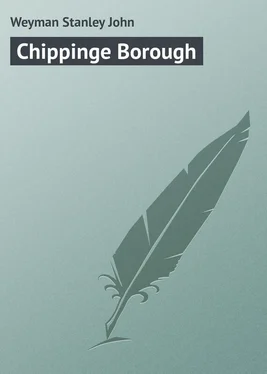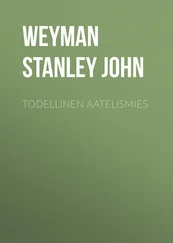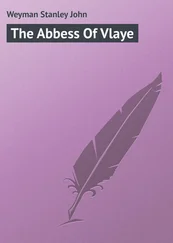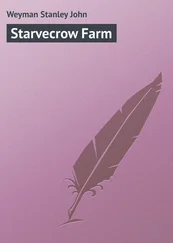Stanley Weyman - Chippinge Borough
Здесь есть возможность читать онлайн «Stanley Weyman - Chippinge Borough» — ознакомительный отрывок электронной книги совершенно бесплатно, а после прочтения отрывка купить полную версию. В некоторых случаях можно слушать аудио, скачать через торрент в формате fb2 и присутствует краткое содержание. Жанр: foreign_prose, на английском языке. Описание произведения, (предисловие) а так же отзывы посетителей доступны на портале библиотеки ЛибКат.
- Название:Chippinge Borough
- Автор:
- Жанр:
- Год:неизвестен
- ISBN:нет данных
- Рейтинг книги:4 / 5. Голосов: 1
-
Избранное:Добавить в избранное
- Отзывы:
-
Ваша оценка:
- 80
- 1
- 2
- 3
- 4
- 5
Chippinge Borough: краткое содержание, описание и аннотация
Предлагаем к чтению аннотацию, описание, краткое содержание или предисловие (зависит от того, что написал сам автор книги «Chippinge Borough»). Если вы не нашли необходимую информацию о книге — напишите в комментариях, мы постараемся отыскать её.
Chippinge Borough — читать онлайн ознакомительный отрывок
Ниже представлен текст книги, разбитый по страницам. Система сохранения места последней прочитанной страницы, позволяет с удобством читать онлайн бесплатно книгу «Chippinge Borough», без необходимости каждый раз заново искать на чём Вы остановились. Поставьте закладку, и сможете в любой момент перейти на страницу, на которой закончили чтение.
Интервал:
Закладка:
"I am sorry," she murmured in a voice which acknowledged defeat. "I am very sorry."
He stood for a moment gazing at the blank space above the fireplace; his head sunk, his shoulders brought forward. He looked years older than the man who had walked under the elms. At length he made an effort to speak in his usual tone. "Yes," he said, "it is a sorry business."
"And I," she said slowly, "can do nothing."
"Nothing," he replied. "Time will cure this, and all things."
"You are sure that there is no mistake?" she pleaded. "That you are not judging her harshly?"
"There is no mistake."
Then she saw the hopelessness of argument and held out her hand.
"Forgive me," she said simply. "I have given you pain, and for nothing. But the old days were so strong upon me-after I saw her-that I could not but come. Think of me at least as a friend, and forgive me."
He bowed low over her hand, but he gave her no assurance. And seeing that he was mastering his agitation, and fearing that if he had leisure to think he might resent her interference, she wasted no time in adieux. She glanced round the well-remembered hall-the hall once smart, now shabby-in which she had seen the flighty girl play many a mad prank. Then she turned sorrowfully to the door, more than suspecting that she would never pass through it again.
He had rung the bell, and Mapp, the butler, and the two men were in attendance. But he handed her to the carriage himself, and placed her in it with old-fashioned courtesy, and with the same scrupulous observance stood bareheaded until it moved away. None the less, his face by its set expression betrayed the nature of the interview; and the carriage had scarcely swept clear of the grounds and entered the park when Lady Louisa turned to her mother.
"Was he very angry?" she asked, eager to be instructed in the mysteries of that life which she was entering.
Lady Lansdowne essayed to snub her. "My dear," she said, "it is not a fit subject for you."
"Still, mother dear, you might tell me. You told me something, and it is not fair to turn yourself into Mrs. Fairchild in a moment. Besides, while you were with him I came on a passage so beautiful, and so pat, it almost made me cry."
"My dear, don't say 'pat,' say 'apposite.'"
"Then apposite, mother," Lady Louisa answered. "Do you read it. There it is."
Lady Lansdowne sniffed, but suffered the book to be put into her hand. Lady Louisa pointed with enthusiasm to a line. "Is it a case like that, mother?" she asked eagerly.
But never either found another
To free the hollow heart from paining.
They stood aloof, the scars remaining,
Like cliffs which had been rent asunder.
A dreary sea now flows between,
But neither heat, nor frost, nor thunder,
Shall wholly do away, I ween,
The marks of that which once hath been.
The mother handed the book back to the daughter without looking at her. "No," she said; "I don't think it is a case like that."
But a moment later she wiped her eyes furtively, and then she told her daughter more, it is to be feared, than Mrs. Fairchild would have approved.
Sir Robert, when they were gone, went heavily to the library, a panelled room looking to the back, in which it was his custom to sit. For many years he had passed some hours of every day, when he was at home, in that room; and until now it had never occurred to his mind that it was dull or shabby. But it was old Mapp's habit to lower the blinds for his master's after-luncheon nap, and they were still down; and the half light which filtered in was like the sheet which rather accentuates than hides the sharp features of the dead. The faded engravings and the calf-bound books which masked the walls, the escritoire, handsome and massive, but stained with ink and strewn with dog's eared accounts, the leathern-covered chair long worn out of shape by his weight, the table beside it with yesterday's "Standard," two or three volumes of the "Anti-Jacobin," and the "Quarterly," a month old and dusty-all to his opened eyes wore a changed aspect. They spoke of the slow decay of years, unchecked by a woman's eye, a woman's hand. They told of the slow degradation of his lonely life. They indicated a like change in himself.
He stood a few moments on the hearth, looking about him with a shocked, pained face. The months and the years had passed irrevocably, while he sat in that chair, poring in a kind of lethargy over those books, working industriously at those accounts. Asked, he had answered that he was growing old, and grown old. But he had never for a moment comprehended, as he comprehended now, that he was old. He had never measured the difference between this and that; between those days troubled by a hundred annoyances, vexations, cares, when in spite of all he had lived, and these days of sullen stagnancy and mere vegetation.
He found the room, he found the reflection, intolerable. And he went out, took with an unsteady hand his garden hat and returned to that broad walk under the elms beside the pool which was his favourite lounge. Perhaps he fancied that the wonted scene would deaden the pain of memory and restore him to his wonted placidity. But his thoughts had been too violently broken. His hands shook, hid lip trembled with the tearless passion of later life. And when his agitation began to die down and something like calmness supervened, this did but enable him to feel more keenly the pangs, not of remorse, but of regret; of bitter, unavailing regret for all the things of which the woman who had lain on his bosom had robbed his life.
Stapylton stood in a side valley projected among the low green hills which fringe the vale of the Wiltshire Avon. From where he stood all within sight, the gentle downs above the house, the arable land which fringed them, the rich pastures below-all, mill and smithy and inn, snug farm and thatched cottage, called him lord. Nay, from the south end of the pool, where a wicket gave entrance to the park-whence also a side view of the treble front of the house could be obtained-the spire of Chippinge church was visible, rising from its ridge in the Avon alley; and to the base of that spire all was his, all had been his father's and his grandfather's. But not an acre, not a rood, would be his child's.
This was no new thought. It was a thought that had saddened him on many and many a summer evening when the shadow of the elms lay far across the sward, and the silence of the stately house, the pale water, the far-stretching farms whispered of the passing of the generations, of the passage of time, of the inevitable end. Where he walked his father had walked; and soon he would go whither his father had gone. And the heir would walk where he walked, listen to the same twilight carollings, hear the first hoot of the distant owl.
Cedes coemptis saltibus, el domo
Villaque, flavus quam Tiberis lavit,
Cedes, et exstructis in altum
Divitiis potietur heres.
But no heir of his blood. No son of his. No man of the Vermuyden name. And for that he had to thank her.
It was this which to-day gave the old thought new poignancy. For that he had to thank her. Truly, in the words wrung from him by the bitterness of his feelings, she had left his house unto him desolate. If even the little girl had lived, the child would have succeeded; and that had been something, that had been much. But the child was dead; and in his heart he laid her death at his wife's door. And a stranger, or one in essentials a stranger, the descendant by a second marriage of his grandmother, Katherine Beckford, was the heir.
Presently the young man would succeed and the old chattels would be swept away to cottage or lumber-room. The old horses would be shot, the old dogs would be hanged, the old servants discharged, perhaps the very trees under which he walked and which he loved would be cut down. The house, the stables, the kennels, all but the cellars would be refurnished; and in the bustle and glitter of the new régime , begun in the sunshine, the twilight of his own latter days would be forgotten in a month.
Читать дальшеИнтервал:
Закладка:
Похожие книги на «Chippinge Borough»
Представляем Вашему вниманию похожие книги на «Chippinge Borough» списком для выбора. Мы отобрали схожую по названию и смыслу литературу в надежде предоставить читателям больше вариантов отыскать новые, интересные, ещё непрочитанные произведения.
Обсуждение, отзывы о книге «Chippinge Borough» и просто собственные мнения читателей. Оставьте ваши комментарии, напишите, что Вы думаете о произведении, его смысле или главных героях. Укажите что конкретно понравилось, а что нет, и почему Вы так считаете.












